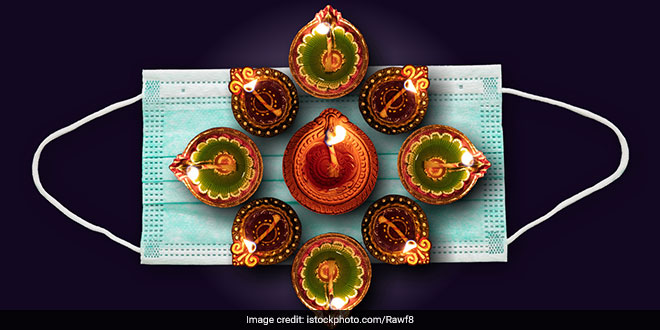Highlights
- Avoid large gatherings indoor: Dr Guleria
- He says opt for N95 mask to protect against both COVID-19 and air pollution
- Please refrain from bursting crackers this year: Dr Guleria
New Delhi: With the onset of winter, the government is warning of the third wave of COVID-19 cases and the ongoing festival season is an added cause for concern. With Diwali approaching, NDTV asked Dr Randeep Guleria, Director of All India Institute Of Medical Sciences (AIIMS), on what precautions should be kept in mind while celebrating the festival of lights to prevent the spread of coronavirus.
Also Read: Ahead Of Diwali, States Ban Firecrackers Due To Air Pollution, Rising COVID-19 Cases
Dr Guleria asked to avoid large gatherings indoors, he said,
Avoid indoor events, we know that indoor events, especially when it is a closed area with a crowd, is a place where this infection can quickly spread. During this time of the festival, people will have indoor parties, card parties, I urge everyone to avoid such rituals this year. They can act as a super spreader event and you may catch and/or spread infections to your family and friends.
Dr Guleria further said that if there has to be some function because it is important, do it outdoor, with a good degree of physical distancing.
Outdoor events decrease the chance of infection as compared to indoor events. But be very careful when it comes to having drinks or eating because you have to put your mask down while consuming them and therefore, it is very important to ensure physical distance while we do that, he said.
Also Read: Opinion: Post-COVID-19 Patients Care During Diwali
This year is the year when we need to be cautious, warns Dr Guleria. He says that we can have more celebrations next year when the pandemic is hopefully over. But this year, we need to be extremely careful, because if we have a spurt of cases among us, our own family members or friends, it will be a big cause of concern. One also would feel guilty that because of an event they organised, caused a number of cases, he said.
Talking about the appropriate mask, that can be used amid the festival, Dr Guleria suggests opting for N95 masks. The AIIMS Director said,
If we look at normal healthy individuals who are going out, then a cloth mask is good enough to prevent you from contracting the coronavirus because it’s a droplet infection. The particle size is larger and these droplets stay in the air for a very little period of time and don’t go very far, but fall down onto surfaces. However, when we consider air pollution, which is another common problem during Diwali, PM 2.5 are ultrafine particles and cloth mask may not be that effective in such a situation. And therefore, I would suggest opting for an N95 mask to be safe against this problem.
When we asked Dr Guleria about his take on fireworks being banned in several states, he says that it is a good move.
Diwali is the festival of lights, we can have lights and diyas at our house but crackers is something that is not essential. Especially at a time when the country is leading a fight against a global pandemic, I think all crackers should be banned but moreover, we should voluntarily stop using crackers at least for this year. As they could affect our lungs, which is already a vulnerable organ for the COVID-19, Dr Guleria signed out.
NDTV – Dettol Banega Swasth India campaign is an extension of the five-year-old Banega Swachh India initiative helmed by Campaign Ambassador Amitabh Bachchan. It aims to spread awareness about critical health issues facing the country. In wake of the current COVID-19 pandemic, the need for WASH (Water, Sanitation and Hygiene) is reaffirmed as handwashing is one of the ways to prevent Coronavirus infection and other diseases. The campaign highlights the importance of nutrition and healthcare for women and children to prevent maternal and child mortality, fight malnutrition, stunting, wasting, anaemia and disease prevention through vaccines. Importance of programmes like Public Distribution System (PDS), Mid-day Meal Scheme, POSHAN Abhiyan and the role of Aganwadis and ASHA workers are also covered. Only a Swachh or clean India where toilets are used and open defecation free (ODF) status achieved as part of the Swachh Bharat Abhiyan launched by Prime Minister Narendra Modi in 2014, can eradicate diseases like diahorrea and become a Swasth or healthy India. The campaign will continue to cover issues like air pollution, waste management, plastic ban, manual scavenging and sanitation workers and menstrual hygiene.
[corona_data_new]





























